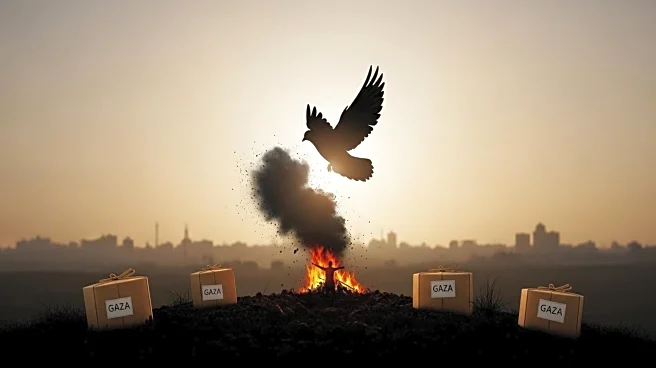What's Happening?
A ceasefire in the ongoing conflict in Gaza has been holding for three days, allowing aid agencies to deliver much-needed supplies to the region. The United Nations and other humanitarian organizations have been able to send cooking gas, flour, fruit, and meat into Gaza for the first time since March. This development follows a truce agreement between Israel and Hamas, which also includes the release of hostages held by both sides. President Trump, who played a role in securing the ceasefire, is scheduled to visit Israel to meet with families of hostages and speak at the Knesset. Additionally, a peace summit is planned in Egypt, co-chaired by Egyptian President Abdel-Fattah el-Sissi, with participation from various international leaders.
Why It's Important?
The ceasefire and subsequent humanitarian efforts are crucial for the residents of Gaza, who have been severely affected by the conflict. The delivery of aid is expected to alleviate some of the immediate needs of the population, which has been living under dire conditions. The involvement of international leaders, including President Trump, underscores the global significance of the situation and the potential for diplomatic progress. The release of hostages and prisoners could also contribute to easing tensions and fostering a more stable environment in the region. The successful implementation of the ceasefire and aid delivery could set a precedent for future peace negotiations and humanitarian interventions.
What's Next?
As the ceasefire continues, aid agencies are preparing to increase the scale of their operations to provide more comprehensive relief to Gaza. The peace summit in Egypt may lead to further diplomatic initiatives aimed at resolving the conflict. The release of hostages and prisoners is expected to proceed, with preparations underway to ensure their safe return. The international community will likely monitor the situation closely, with potential implications for regional stability and future peace efforts. The role of private sector involvement in the reconstruction of Gaza is also being considered, which could provide additional resources for rebuilding efforts.
Beyond the Headlines
The humanitarian crisis in Gaza highlights the broader challenges of conflict resolution and the need for sustained international cooperation. The ethical and legal dimensions of the situation, including the treatment of hostages and prisoners, are significant considerations for policymakers. The long-term impact on the region's socio-economic conditions and the potential for cultural shifts in response to the conflict are areas that may require further exploration. The involvement of various international leaders and organizations reflects the complexity of the geopolitical landscape and the importance of collaborative efforts in addressing humanitarian issues.










